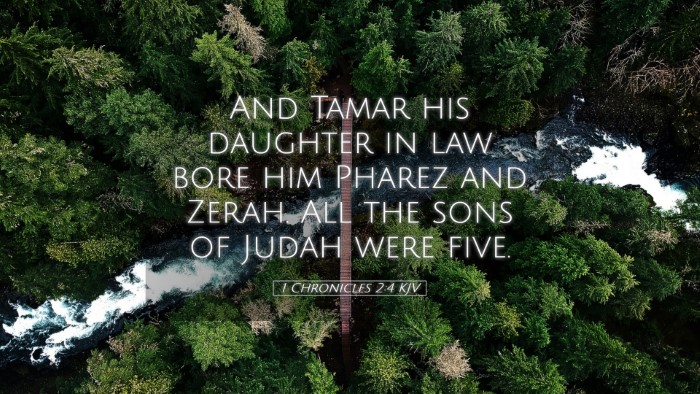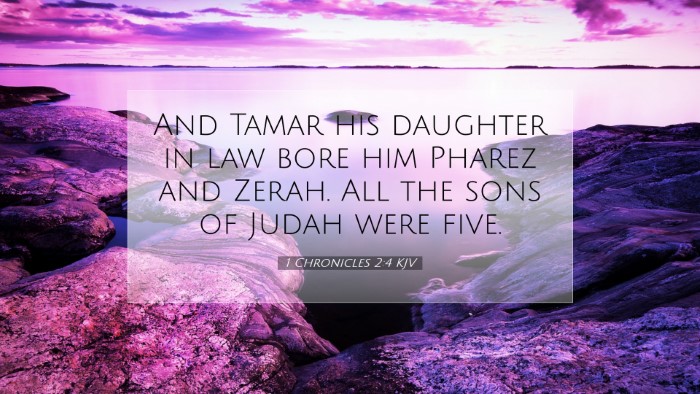Commentary on 1 Chronicles 2:4
1 Chronicles 2:4: "And Tamar his daughter-in-law bore him Pharez and Zerah. Judah had five sons in all."
Introduction
The genealogies in the Chronicles serve a vital purpose in understanding the historical context and the individuals involved in God’s covenant with Israel. In this particular verse, we find references to Judah, one of the twelve sons of Jacob, and his descendants through Tamar. Various public domain commentaries provide rich insights into the implications of this genealogy, especially in terms of redemptive history.
Context and Structure
In the broader context of 1 Chronicles, the genealogies serve to affirm the legitimacy of Israel’s ancestral lines, particularly through Judah, the tribe from which David and subsequently Jesus Christ would descend. This lineage places significant weight on the mention of Judah and his family, as it directly ties to the Messianic line.
Insights from Matthew Henry
Matthew Henry notes that Judah's lineage, specifically through Tamar, illustrates God's providence and mercy in using flawed individuals and circumstances to fulfill His divine plan. Tamar, being a Gentile and having a complex story of widowhood and levirate marriage, showcases the theme of redemption that permeates Scripture. Henry emphasizes that the mention of Pharez and Zerah signifies not only the continuity of Judah's lineage but also highlights God’s ability to bring good from difficult situations.
Insights from Albert Barnes
Albert Barnes comments on the significance of the names Pharez and Zerah. He explains that Pharez, meaning 'breach', signifies how God can break through barriers. Zerah, meaning 'dawn', indicates the emergence of a new beginning. This duality reflects the dynamic nature of God’s purposes and foreshadows the coming of Christ, whose birth would mark a new dawn for humanity. Barnes underlines the importance of the narrative around Tamar and Judah as it poises us to understand the extraordinary journey of God’s redemptive plan.
Insights from Adam Clarke
Adam Clarke provides a deep exploration into the character of Judah and Tamar. He points out that Tamar’s actions, while controversial, ultimately serve to ensure the survival of the messianic line. Clarke argues that this episode should not be viewed through a contemporary lens without consideration of the cultural and historical context of the time. He emphasizes that the account underscores God's grace operating through human failings and the critical role women's stories play in the biblical narrative.
Theological Implications
The genealogy presented in 1 Chronicles 2:4 does not merely serve as a record; it carries profound theological implications. It showcases the multifaceted nature of God’s sovereign plan—a plan that encompasses every aspect of human life, including the flawed decisions of its characters. This is particularly significant for pastors and theologians who seek to illustrate God's unwavering faithfulness amidst human shortcomings.
Application for Contemporary Readers
For modern readers, this verse invites reflection on how God uses unexpected people and scenarios to fulfill His promises. It challenges those in ministry to embrace and recognize the potential of underrepresented voices and stories within the church and society. The lineage of Judah, marked by struggle and redemption, serves as a reminder that God's plans often unfold through the very imperfections that people might wish to hide.
- Embrace Diversity: Just as Tamar’s inclusion signifies the breadth of God’s grace, current ministries should seek to embrace diversity within their congregations.
- Redemptive Framework: A recognition that God uses flawed individuals can foster a redemptive vision, encouraging those who feel inadequate.
- Covenant Faithfulness: Understanding the genealogical narrative encourages trust in God's promises, even when circumstances appear dire or unpromising.
Conclusion
1 Chronicles 2:4 encapsulates a pivotal moment in the unfolding story of Israel and ultimately points towards the redemptive work of Christ. The insights drawn from public domain commentaries by Matthew Henry, Albert Barnes, and Adam Clarke offer a layered understanding of this text. They remind the reader that, through all generations and circumstances, God is orchestrating history to fulfill His divine purposes, showing that His grace is sufficient for all, regardless of their background or choices.


